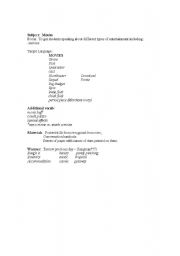
|
Movies
Lesson plan for movies
Level: intermediate
Age: 13-17
Type: lesson-plan
Downloads: 0
|
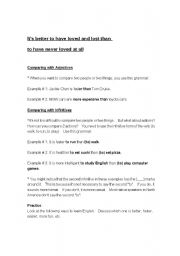
|
Comparing Actions using infinitives
An explanation of comparing infinitives. It starts by reviewing what should be familiar grammar at this point: comparing nouns (aka the simple comparative forms). Then it explains that we sometimes want to compare actions, and gives the grammar to do it. It then adds a simple exercise for class discussion on the best ways to study english. It c...
Level: intermediate
Age: 14-17
Type: worksheet
Downloads: 2
|
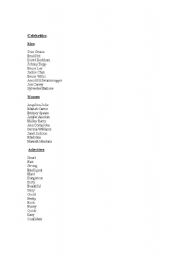
|
Comparing celebrities and their actions
A list of celebrities and adjectives, and exercises to guide students in using the comparative form of adverbs.
Level: elementary
Age: 12-17
Type: worksheet
Downloads: 0
|
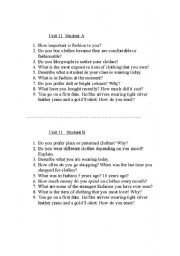
|
Shopping Conversation Questions
Conversation questions for pair work
Level: intermediate
Age: 14-17
Type: article
Downloads: 2
|
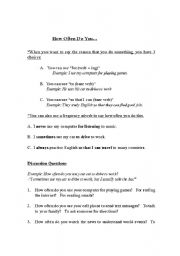
|
Why we do things: to, for, so that
A description of the prepositions "to", "for", and "so that" as they are used for describing why we do things, or what we use things to do. This is combined with frequency adverbs, and the lesson includes several questions for class discussion or writing practice.
Level: elementary
Age: 14-17
Type: worksheet
Downloads: 2
|
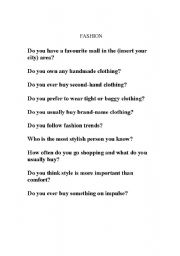
|
Fashion questions
Questions on fashion preferences
Level: intermediate
Age: 12-17
Type: worksheet
Downloads: 1
|
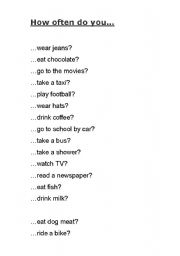
|
Adverbs of frequency Lesson
This is a grammar explanation and a game with flash cards. Enjoy!
Level: elementary
Age: 3-17
Type: activity-card
Downloads: 4
|
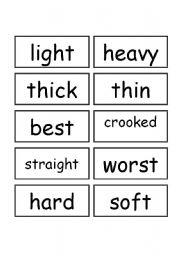
|
Adjective Flashcards round 2
A second adjective flashcard sheet. This one has four pages.
Level: elementary
Age: 3-17
Type: flash-card
Downloads: 2
|
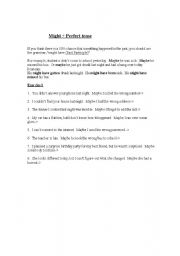
|
might + perfect tense
A basic description of might + perfect tense and 2 sets of questions. The first set is very leading, with the answer provided as a maybe sentence, and the second set allows the student to create their own theory on what happened.
Level: intermediate
Age: 14-17
Type: worksheet
Downloads: 0
|
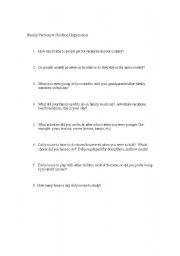
|
Used to: family vacations
Discussion or writing questions (on the topic of childhood vacations) to practice the "used to" form.
Level: intermediate
Age: 14-17
Type: worksheet
Downloads: 3
|